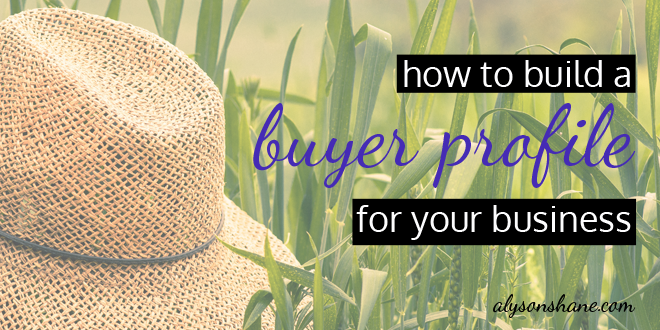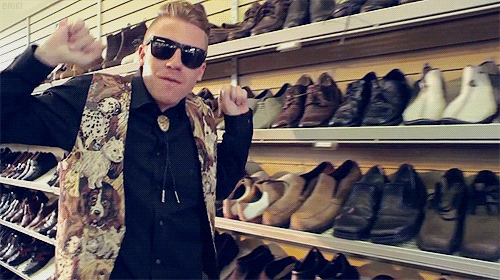How to Create Buyer Personas That Work for Your Business
Let me tell you a dirty secret: I hated building buyer personas when I was taking my business courses in university. I thought they were useless, frivolous, and something that marketing agencies could charge exorbitant fees to their customers to develop.
Then, as it so often happens in the world of Being an Adult, I started running my own business and learned that I was totally wrong.
In fact, understanding and developing buyer personas was, in fact an integral part of understanding a businesses' target audience, and how best to communicate with them.
As I so often say when it comes to advice I dole out on this blog: do as I say, not as I've done. Learn from my mistakes; understand what a buyer persona is and how it benefits your business, and use it to the best of your abilities.
Not sure what a buyer persona is, or how it can help your business? No worries, I've got you covered:

What are buyer personas & what do they do?
At it's core, a buyer persona is essentially a portrait of your ideal customer.
In terms of content marketing strategy, having a comprehensive buyer persona helps businesses (or people like me!) deliver content which is timely, informative, and that your audience actually want to see and consume.
Different people respond differently to various kinda of images, messaging, and communication, and it's important to take these perspectives into consideration while figuring out how to best serve your customers.
For example, a 20-year-old Snapchat user who is starting university and has very little disposable income will have respond to different messages, and will have different motivations, goals, and purchasing power than a 45-year-old father of two who is a CEO at his company and has lots of disposable income. Now, your business may not be trying to appeal to both of these extremes, but what this is meant to illustrate is that you need to know who your ideal buyers are, why they should care about your business, and (more importantly) how your product or service can appeal to them or make their lives easier.
How can you build buyer personas that really work?
The key to building effective buyer personas is that you have to make a bunch of them. This may feel like tedious work (my university-era self would agree) but creating a few personas can help you develop well-rounded ideas about the kinds of people you want to communicate with, and who you think are the ones who would be interested in buying what you have to offer.
You don't have to get super specific, but identifying the following areas are generally pretty useful:
Basic info
- Name. This isn't technically necessary, but I like naming my buyer personas. I find it helps with keeping track of who they are, and makes them feel a bit more "real".
- Job title. Are they CEOs? Mid-level management? Students working at Starbucks? Like I said earlier, where they are in their professional life will influence their purchasing power.
- Details about their job title or role. These flesh out their day-to-day motivations at work and help inform what they may be looking for professionally.
General demographics
- Age. Different generations and age brackets have different motivations and priorities, and it's important to identify what they are in order to figure out what they want.
- Gender. Are you marketing your products to men, women, both, or otherwise?
- Location. Where your ideal customers are can make a huge difference on how you craft your message to them.
- Salary. Lots of people are afraid to talk about money and finances, but let's be honest: how much your buyers have to spend influences whether or not they have monty to buy your products or services.
- Education. People's level of education shapes a variety of areas such as their level of employment, salary, interests, and much more.
- Family. Are they single? Married? Do they have 2.5 kids? Are they close with their extended family? Their ties to their families and those obligations will influence their purchasing power.
Values & objections
- Values. What are the things that your buyers believe to be important or valuable? Eg: buying local; investing in secondhand or slow fashion; or driving an expensive BMW.
- Objections. What are some objections that could come up during the sales process? Eg: your product is too expensive; too niche; too complicated for a layman to see any value, etc.

(do your buyers shop like Kanye or like Macklemore?)
Extras
This area can change a bit depending on what your business sells, but generally some other areas which can help build an accurate buyer profile are:
- Computer literacy. Do your buyers go mining for Bitcoins, or do they struggle to find the Any Key?
- News sources. Your customers' values will likely be different depending on whether they get their news from Fox News or Al-Jazeera.
- Hobbies. How your customers spend their free time can help you understand more about their motivations and values.
- Interviews and real-life examples. If you already have an existing customer base, take a look at your reviews and customer service experiences. How do people talk to your team, or speak about your business?
Sussing this information out
Figuring out all this information by yourself may seem like an impossible task, but it isn't! There are actually a variety of ways that you can find the information you need to build a series of effective buyer personas, which are:
- Asking your team and colleagues. As I said earlier, if your business is already customer-facing you can speak to team members who interact with your customers to build complete profiles.
- Check your website stats. This should be obvious, but if not some things to look for are: keywords people used to find your website, where your visitors came from, and the actions they took while they were on your page. If your website doesn't have Google Analytics installed, back the hell up and install it before coming back to this article. Your analytics tool is one of the best tools at your disposal for understanding customer behaviour.
- Use social media. Look for services or products similar to your own and spend some time analyzing the discussions happening on Facebook, Twitter, LinkedIn, and on blogs. People are more likely to share negative experiences than positive ones online, which can provide you with important insight into the areas where your buyers feel your industry could be doing better.
Why does this process matter?
This may seem like a lot of work (and trust me, it is!) but taking the time to investigate and research your potential customers and to create well-rounded buyer personas can go a long way towards helping you understand your businesses' strengths and weaknesses. Spending time on this process helps your business provide a better experience for your customers.
Still want a little more help creating an effective buyer persona? Check out these free buyer persona templates from HubSpot. They're what I use day-to-day, and I'm sure you'll find them to be invaluable, as well!
How do you create buyer personas for your business? Do you have anything to add to what I've outlined in this post? Tweet at me or tell me in the comments!
